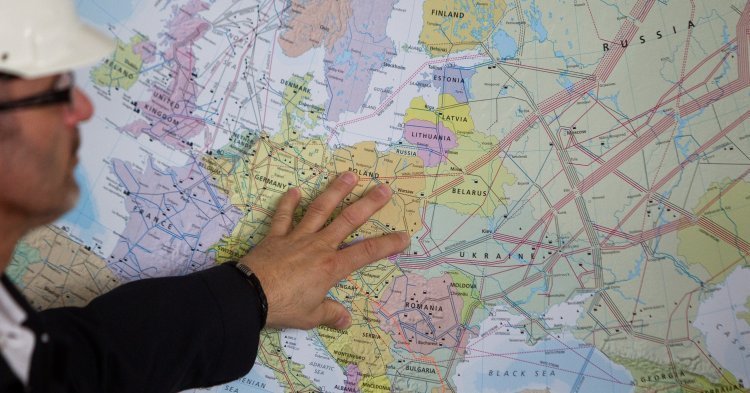What is the Nord Stream II project?
Nord Stream II is a gas pipeline project which is to connect Vyborg in Russia to Greifswald in the north east of Germany, and which would follow almost the same route as Nord Stream I which has been in service since 2011. The pipeline connects the biggest supplier of natural gas, Russia, to the biggest consumer in Europe, Germany.
The construction of Nord Stream II is motivated by several factors. Firstly, given the increasing gas consumption in Europe, existing gas pipelines are at their maximum capacity (Nord Stream I of course, but also the Yamal-Europe pipeline that crosses Belarus, and the Bratstvo, or “Brotherhood” pipeline that crosses Ukraine). Indeed, gas energy is less polluting than oil in certain uses, for example heating and electricity, and natural gas could therefore be an interesting alternative for a continent that is undergoing an energy transition.
Secondly, Europe is more and more dependent on imports of fossil energies. Currently, 55% of the energy consumed in Europe comes from external suppliers. 70% of the natural gas consumed by EU member states comes from elsewhere, mainly from a handful of countries: Norway, Algeria and above all Russia. Domestic gas reserves, especially those of the Netherlands and of the United Kingdom, are depleting and shale gas isn’t an appealing solution for remedying European dependence. “Liquefied natural gas” (LNG), for its part, is a costly solution (transport via sea routes is much more expensive than transport through a pipeline), and mainly used by Southern European countries.
All of these arguments are evoked by supporters of the Nord Stream II project. Europe is an energy-dependent continent that has taken strong action in the field of energy transition. Therefore for some, especially Berlin and Moscow, Russian gas seems to be a miraculous opportunity.
A highly controversial project
Even though the Nord Stream II project seemed to be on the right track in order for it to be effectively implemented by end of 2019, the recent news may delay the completion of the project led by Germany and Russia. Namely, Denmark decided to conduct an environmental impact assessment in its territorial waters before giving a green light to building the last segment of the pipeline.
The small Nordic country is indeed the last one which still has to give its authorisation for the pipeline to cross its territorial waters, as Russia, Finland, Sweden and Germany have already done so – although for these countries, the pipeline would pass through their exclusive economic zones (EEZ) rather than territorial waters.
Even if the Danish Prime Minister, Lars Løkke Rasmussen, has expressed his hostility to the project numerous times, saying that he will ‘do whatever he can to delay the project, even if he cannot prevent it’, according to the Danish Energy Agency, Copenhagen is not calling for the project to be stopped completely. The agency has simply “requested” for an investigation into “the environmental impacts of a route south of Bornholm in the continental shelf area”, EurActiv reports.
Copenhagen’s judgement on the route of Nord Stream II will depend on the results of this investigation, and could certainly push the country to ask the Russian Gazprom company to propose an alternative route that wouldn’t pass through Danish waters. This would further delay the inauguration of Nord Stream II whose construction, however, has already begun.
Still, the Danish decision isn’t entirely anodyne: Nord Stream II is indeed a very controversial project. Central and Eastern European countries, located between Germany and Russia (Poland, the Baltic states and Ukraine), are opposed to the initiative. While Poland, Lithuania, Latvia and Estonia are afraid that Nord Stream II will further reinforce European dependence on Russian gas, Ukraine argues that the diversion of gas traffic from its territory would create a considerable revenue shortfall. The fees taken by Kyiv for the transmission of gas through its territory towards the European Union represent more than 2% of the Ukrainian GDP.
Does the pipeline go against Europe’s energy policy?
Are these countries’ fears justified? Indeed, certain aspects of Nord Stream II go against the grain of a European energy policy based on solidarity between member states and with their immediate neighbours, especially in Eastern Europe and the Caucasus.
One of the pillars of EU energy policy is the diversification of the energy sources and of transit countries within the EU itself. With the Nord Stream II pipeline, Russia would export even more towards the EU and Germany would acquire a predominant position as a point of entry of natural gas (30% of gas would be arriving in the EU via Germany, an increase from the current figure of 15%). Poland and the Baltic states, but also Slovakia and Ukraine, would lose revenue related to the transmission of gas. Moreover, by focusing too much on gas, Germany and other European countries could see their energy transition to homegrown and renewable energies – a fundamental objective of European energy policy – delayed.
Another issue is legislative: could European rules apply to the Nord Stream II pipeline, especially those concerning the liberalisation of gas markets? These rules have been laid out in the Third Energy Package: the unbundling of energy suppliers from network operators, price transparency and the right for all European countries to access the network – all these points are to be supervised by the European Commission. Germany had long voted against the matter, but last February the 28 EU member states found a political agreement concerning the revision of the directive on the transport of gas. This would oblige Gazprom, among others, to respect the unbundling rule. The vote on the directive could therefore delay the inauguration of Nord Stream II even further.
In the end, the Danish decision to delay its authorisation is but the latest tip of the iceberg in the Nord Stream II imbroglio. The following weeks will certainly be decisive for this highly controversial project.



Follow the comments: |
|
